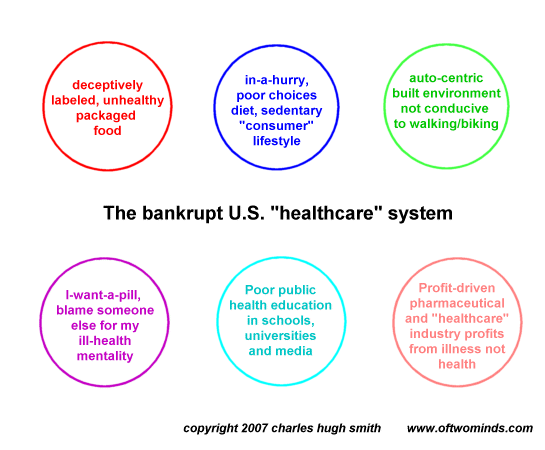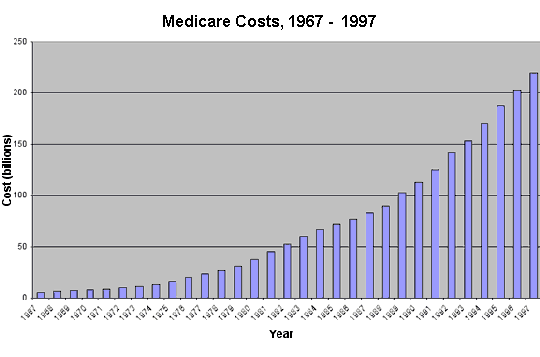

|
| weblog/wEssays archives | home | |
|
Health, Healthcare and Bankruptcy (May 24, 2007) This Week's Theme: Why The Truth Can't Be Told If I were a small-business employer, I wouldn't hire myself. Why? I'm over 50. Maybe I'd hire myself for cash, more or less like a day laborer; but as an employee with healthcare and other benefits? Are you insane? The healthcare premiums are over $1,000 a month. Would I hire a guy or gal with three kids? Heck no, same reason. Bennies cost too much. Would I hire a diabetic or person with chronic health conditions? No way. Would it make financial sense for me to hire a no-benefits contract worker, or a "non-legal" worker for cash? Absolutely. Some readers have pointed out that employee healthcare costs are not an issue to global companies like Exxon, but the truth is large multinational corporations have been shedding jobs in the U.S. in favor of foreign-based workers for years. This is largely the result of global reach--it only make sense to grow your workforce where your markets are also growing--but I doubt Intel et. al. are entirely impervious to rising medical and pension costs in the U.S. For a snapshot of an ailing U.S. company in an ailing industry, consider these "legacy costs" for auto maker Chrysler: In for an overhaul. Cerberus Capital Management, a New York private equity firm, will pay $7.8 billion for the iconic automaker, with almost all of that going to recapitalize Chrysler.That $30/hour isn't wages--the Japanese aren't paid $10/hour and the U.S. worker paid $40/hour. It's the "overhead" costs for medical insurance, pensions, vacation, sick-leave, etc. It's painfully obvious that the only way Chryler will survive is if the $18 billion in pension obligations and the ongoing billions to pay for generous healthcare and other benefits are slashed/eliminated. The heading-for-bankruptcy "healthcare" system in the U.S. is the elephant in the room no one wants to talk about when it comes to "saving or creating jobs" in the U.S. Capitalism can be boiled down to this: capital will flow to the highest returns. Once the burdens of healthcare, sick leave, etc. become too onerous then capital will leave for higher-return climes and businesses. So let's get real. The decision for global corporations isn't between jobs in the U.S. and China--it's between expanding the workforce in China or India, Vietnam, Poland, Brazil, etc. It's also inaccurate to keep talking about cost, as if the problem with healthcare in the U.S. was simply money. It isn't. It's an entire system of ill-health: 
I have discussed the packaged food industry's game of shuck-and-jive when it comes to labeling the food you're eating: "organic" peanut butter loaded with hydrogenated palm oil, the high-fructose sugar laden bottled beverage which contains "two servings" as a way of making the calorie count look reasonable, and on and on. Pet food is much more accurately labeled than human food. I have also discussed how our built environment is not condusive to walking and biking--the easiest ways to get some exercise. The waste, fraud and poor results which result from a litigious, ill-informed, profit-driven society's attempts to "fix" poor health with pills and surgery is too well documented to be worthy of elucidation. Everybody knows this but no one wants to make the sacrifices/trade-offs necessary to get past these barriers. So we're left arguing about how to pay for a broken system which is heading off a cliff of fiscal insolvency. Rather than talk about reality--that the broken, inefficient, ever-more-costly "healthcare" system is a key driver in why good jobs are disappearing in the U.S., we argue about details--the classic "rearranging the deck chairs on the Titanic"--as if a cost-based debate will solve poor diet, unhealthy food, sedentary, passive "consumer" media-centric lifestyles, greedy pharmaceutical companies, public hospitals hovering on the brink of financial disaster, and a host of other ills of our system too long to even list here. So why can't we have an honest discussion of the many causes of this catastrophe? The answer is profit: the immensely profitable web of the food industry, the doctor-owned clinics, the drug companies, the paper-pushers who bilk Medicare, the public "healthcare" companies, etc. If the system were revolutionized to make health an incentive rather than the current system in which ill-health is "the profit center," then all the profitable apple carts would be overturned. And that is Why The Truth Can't Be Told. Here's one more chart for your review: 
For more on this subject and a wide array of other topics, please visit my weblog. copyright © 2007 Charles Hugh Smith. All rights reserved in all media. I would be honored if you linked this wEssay to your site, or printed a copy for your own use. |
||
| weblog/wEssays | home |